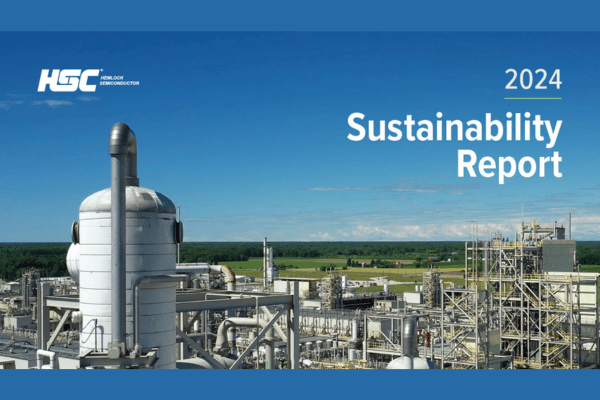Hemlock Semiconductor, the nation’s leading producer of hyper-pure polysilicon for the semiconductor and solar industries, announced the release of its third biennial sustainability report. The 2024 sustainability report highlights the company’s key role in the clean energy economy and notes the progress HSC has made over the past two years in achieving its voluntary sustainability commitments.
“Amid an ever-changing world, one constant is Hemlock Semiconductor’s commitment to creating a more sustainable society and a healthier planet for future generations,” said HSC Chairman and CEO AB Ghosh. “We are taking several actions to move us closer to attaining the voluntary commitments set forth in our 2022 sustainability report, and it is clear that we have untapped potential and unlimited resolve to do even more.”
HSC’s comprehensive approach to sustainability aims to reduce waste, reuse critical resources, power manufacturing processes with cleaner energy, enhance safety, strengthen workplace culture, and create more resilient communities where HSC employees live and raise their families.
The report notes that HSC’s hyper-pure polysilicon powers solar technologies that promise to deliver greener, more affordable energy, reducing dependence on fossil fuels and helping mitigate the causes of climate change. HSC’s polysilicon facilitates the production of ultra low-carbon solar panels, allowing solar developers and owners to reduce embodied carbon by up to 50 percent.
HSC’s voluntary sustainability commitments include:
- Aligning with our parent company’s (Corning Inc.) Science-Based Targets initiative (SBTi) to reduce Scope 1 and 2 greenhouse gas emissions 30% by 2028 aligned with a 1.5°C maximum temperature rise.
- Enhancing strategies to drive waste streams into their lowest possible environmental impact.
- Continuing to learn from our injuries and property incidents to maintain our safety metrics in the top quartile of our industry benchmark – NAICS 327000 – Nonmetallic Mineral Product Manufacturing.
- Continuing strong corporate citizenship, community financial support and encouraging increased employee volunteerism by rewarding and recognizing employees’ efforts.
- Develop strategies for creating a more diverse, equitable and inclusive culture while advancing underrepresented people within our entire organization.
- Partnering with suppliers to live our Supplier Code of Conduct and reduce greenhouse gas emissions.
HSC’s 2024 report highlights several important developments since the last report, including elevating water usage as a material issue, the integration of HSC’s contract workforce as fully-vested employees, and the completion of the Next-Generation Finishing facility, which increases production capacity and takes the purity of HSC’s semi-grade polysilicon to the next level, opening new frontiers for innovation that will drive us toward a more sustainable future.
The 50-page 2024 Sustainability Report notes that during 2022 and 2023, HSC:
- Worked closely with Corning Inc. to develop a holistic roadmap to reduce Scope 1, 2 & 3 greenhouse gas emissions; implemented multiple energy efficiency projects and continued assessment of additional projects; and signed on with EPA Energy Star and DOE Better Climate Challenge.
- Developed a new management process to support waste reduction.
- Significantly stepped up safety activities, putting both people and capital to work to reduce our OSHA total recordable injury rate (TRIR).
- Announced a new Corporate Contributions Strategy to build on three pillars: Energize, Create, Build.
- Developed a robust five-prong strategy to drive clear actions to achieve a diverse and inclusive workplace.
The report also highlights HSC’s collaboration with industry partners to drive down carbon emissions across the global polysilicon supply chain, reduce embodied carbon in photovoltaic products, and facilitate further improvements in energy efficiency.
“The hard truth about sustainability is that no one can do it alone. I cannot understate the importance of our partnership work – whether through the Ultra Low-Carbon Solar Alliance (ULCSA) developing a new embodied carbon standard that we embedded into the solar EPEAT standard, or our work with Consumers Energy to support our energy efficiency and green energy strategies, which resulted in significant rebates based on our energy reduction,” said HSC Sustainability Leader Steven Holty. “I expect that our partnership work will continue to grow and pay dividends as we utilize the power of the full supply chain to drive more sustainable actions.













